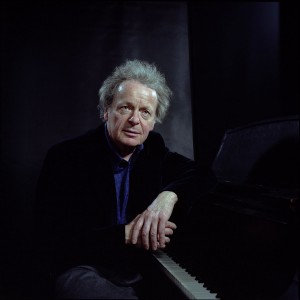
Kuerti recital focuses on the imperishable Beethoven
Earlier this year the young South Korean pianist HJ (Hyun-Jung) Lim caused a mini-sensation in the classical world when EMI released her recordings of the complete 32 piano sonatas of Beethoven.
The recording debuted in the top berth of the Billboard and iTunes charts before coming down, but not before Lim, who had been a relatively unknown player, etched her name on this particular Everest of the classical piano world (here she is discussing the project, speaking in fluent, French-accented English).
Tomorrow night, three of these sonatas will constitute most of the program on the first seasonal concert by the Friends of Chamber Music of Miami when the eminent Austro-Canadian pianist Anton Kuerti arrives to play them. Kuerti is playing all of the sonatas over a period of several years in recital, and has long been known as a major Beethoven interpreter. He’ll also be at West Palm Beach’s Kravis Center on January 8, when he plays the Beethoven Second Piano Concerto and the Mozart Piano Concerto No. 9 with the New York Chamber Soloists.
On Thursday night’s concert at Coral Gables Congregational Church, Kuerti will play sonatas from three major compositional periods of Beethoven’s career. The Sonata No. 6 (in F, Op. 10, No. 2), published in 1798, presents the young Beethoven exploring a muscular new idiom, recognizably in touch with the immediate past of Haydn (then still alive and working) and Mozart, but just as unmistakably offering a fresh new voice (here’s Glenn Gould in the finale).
The Sonata No. 12 (in A-flat, Op. 26), written in 1800 and published two years later, opens with a theme and five variations, but variations of remarkable variety for their time, each one quite unlike the other and with that Beethovenian rhythmic drive that marks one of the composer’s sharpest breaks with the past. It can be heard in the following Scherzo, too, which is sort of a cousin to the slow movement of the Sonata No. 6, but with a more unstable metric layout.
The sonata also is celebrated for the third movement, a powerful movement subtitled “Funeral March on the Death of a Hero,” in the far-distant key of A-flat minor and full of echt-Romantic dramatic gestures, a piece that sounds orchestral – and indeed Beethoven would borrow it 15 years later for some incidental music to a theater piece (here is Daniel Barenboim in the funeral march).
Kuerti also will play the very last sonata, No. 32 in C minor, Op. 111, composed about five years before Beethoven’s death, and a work of total originality. In just two movements, unlike the usual three or four, the sonata’s first movement is a wild, granitic exploration of a seemingly simple, almost obvious thematic idea that the composer turns into something titanic. And the second movement is one of the most celebrated in all of Beethoven, another theme and five variations, but this time beginning with a gentle, hushed Arietta that unfolds slowly over the space of nearly 20 minutes from a series of shocks and stutters into a world of total unbroken peace, full of long trills and an expansive tonal and meditative landscape that pianists find quite difficult to sustain (here’s Claudio Arrau in the first movement).
With those three works, and the six Bagatelles (Op. 126), one of the very last piano pieces Beethoven composed, Kuerti is bringing a nourishing, fulfilling program in the older style of piano recitals, when they were the occasion for the deepest thoughts on musical art. He is one of the finest pianists in that tradition, extending a line from his teachers, who included Rudolf Serkin and Mieczyslaw Horszowski.
The program also is a reminder of the centrality of these works to the piano repertoire specifically, and to Western musical art in general. In these pieces, written over the length of his compositional life, Beethoven put the piano center stage in a way it had never been before. Although they are the vehicles for some of the composer’s most profound, intimate thoughts, they also forever changed the way performers and audiences thought about the instrument, which at that time was undergoing a huge technological transformation from a tinny-voiced music box into the sleek machine we know today.
Julian Kreeger has lined up a great set of pianists for his FOCM series this season, and he’s starting it off splendidly with this program, with one of the world’s foremost Beethoven interpreters in the music on which he’s founded a successful professional and artistic life. And as HJ Lim showed only a few months ago, Beethoven is still terrific box office.
Anton Kuerti performs at 8 p.m. Thursday at Coral Gables Congregational United Church of Christ, 3010 De Soto Blvd., Coral Gables. Tickets are $35; $10 for students. Call 305-372-2975 or visit www.miamichambermusic.org.
Recent Content
-
Artsarticle ·
-
Artsarticle ·
-
Artsarticle ·

